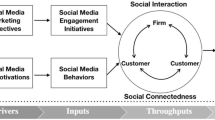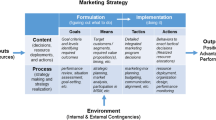Abstract
In this essay, my focus is on one critically important aspect of marketing doctoral programs: theory development. Theory animates everything we do in our discipline. Therefore, it is imperative that doctoral programs place theory at the heart of curriculum that shapes the thinking, priorities, and research efforts of our new scholars. Unfortunately, in many doctoral programs, this does not happen. To spur a conversation on this critically important issue in our discipline, I suggest five initiatives that seek to reimagine the content and structure of marketing doctoral programs. These initiatives are: (1) Add marketing to marketing doctoral programs; (2) Create a dedicated space in the curriculum for theory construction; (3) Restructure the sequence of doctoral seminars; (4) Make a foundational essay mandatory in dissertations; and (5) Change the culture of marketing doctoral programs.
Similar content being viewed by others
Notes
There are a number of excellent resources in the literature focusing on the meaning of the term “theory”—what it connotes and scholarly activities involved in its development (see, e.g., Hunt 1991; MacInnis 2011; Sutton and Staw 1995; Zaltman et al. 1982). These writings generally view theory as a set of structured statements that purport to explain a focal phenomenon, can be empirically verified, and have some law-like generalizations.
Two primary criteria guided the selection of these case studies: my familiarity with them and their potential to provide more general insights about doctoral programs. The case studies are illustrative. There are a number of other exemplary doctoral programs, in the United States and elsewhere, that could also have served as a basis for highlighting characteristics that make the doctoral experience distinctive and impactful.
In this section, I rely on terminology (e.g., seminars) that is used frequently in the United States but may be less common in other countries. It is also worth noting that there can be substantial variation across countries in terms of the nature of formal coursework. Formal coursework is required in most doctoral programs in the United States, but this is not the case in Europe and other regions of the world. Despite these variations, the argument made in this section—that sequence of learning in doctoral programs needs rethinking—is applicable broadly in all doctoral programs.
References
Banks, G. C., Pollack, J. M., Bochantin, J., Kirkman, B. L., Whelpley, C. E., & O'Boyle, E. H. (2016). Management's science-practice gap: A grand challenge for all stakeholders. Academy of Management Journal, 59(6), 2205–2231.
Belk, R. W., MacInnis, D. J., & Yadav, M. S. (2019). Personal accounts and an anatomy of conceptual and theoretical articles in the special issue. Journal of Marketing Management, 35(1–2), 1–12.
Bennis, W. G., & O’Toole, J. (2005). How business schools lost their way. Harvard Business Review, 83(5), 96–104.
Brinberg, D. L., & McGrath, J. (1985). Validity and the research process. Beverly Hills: Sage Publications.
Clark, T., Key, T., Hodis, M., & Rajaratnam, D. (2014). The intellectual ecology of mainstream marketing research: An inquiry into the place of marketing in the family of business disciplines. Journal of the Academy of Marketing Science, 42(3), 223–241.
Desai, P. S., Bell, D., Soberman, D., & Lilien, G. (2012). The science-to-practice initiative: Getting new marketing science thinking into the real world. Marketing Science, 31(1), 1–3.
Hunt, S. D. (1991). Modern marketing theory: Critical issues in philosophy of marketing science. Cincinnati: South-Western Publishing.
Hunt, S. D. (2010). Doctoral seminars in marketing theory for incorporating the history of marketing practice and thought. Journal of Historical Research in Marketing, 2(4), 443–446.
Kohli, A. K., & Jaworski, B. J. (1990). Market orientation: The construct, research propositions, and managerial implications. Journal of Marketing, 54(April), 1–18.
MacInnis, D. J. (2011). A framework for conceptual contributions in marketing. Journal of Marketing, 75(4), 136–154.
Monroe, K. B. (1988). Developing, disseminating, and utilizing marketing knowledge. Journal of Marketing Research, 52(October), 1–25.
Moorman, C., van Heerde, H. J., Moreau, C. P., & Palmatier, R. W. (2019). Challenging the boundaries of marketing. Journal of Marketing, 83(May), 1–4.
Ozanne, J. L., Fern, E. F., & Yadav, M. S. (1990). A conceptual framework for evaluating interdisciplinary research in marketing. In V. Zeithaml (Ed.), Review of marketing (Vol. 4, pp. 457–480). Chicago: American Marketing Association.
Pham, M. T. (2013). The seven sins of consumer psychology. Journal of Consumer Psychology, 23(4), 411–423.
Reibstein, D. J., Day, G., & Wind, J. (2009). Is marketing academia losing its way? Journal of Marketing, 73(4), 1–3.
Rust, R. T. (2006). From the editor: The maturation of marketing as an academic discipline. Journal of Marketing, 70(3), 1–2.
Sheth, J. N. (2018), Legends in marketing: Gerald Zaltman, volume: Theory construction, M. S. Yadav, volume editor, New Delhi, India: Sage publications.
Sutton, R., & Staw, B. M. (1995). What theory is not. Administrative Science Quarterly, 40(3), 371–384.
Van de Ven, A. H., & Johnson, P. E. (2006). Knowledge for theory and practice. Academy of Management Review, 31(4), 802–821.
Vargo, S. L. (2020). Moving forward. AMS Review, 9(3-4), 133–135.
Webster, F., & Lusch, R. (2013). Elevating marketing: marketing is dead! Long live marketing! Journal of the Academy of Marketing Science, 41(4), 389–399.
Yadav, M. S. (2010). The decline of conceptual articles and implications for knowledge development. Journal of Marketing, 74(January), 1–19.
Yadav, M. S. (2014). Enhancing theory development in marketing. AMS Review, 4(1–2), 1–4.
Yadav, M. S. (2017). Disciplinary memory and theory development. AMS Review, 7(1–2), 1–3.
Yadav, M. S. (2019). AMS review: Progress toward a world-class journal dedicated to theory development. AMS Review, 9(1–2), 1–4.
Zaltman, G. (2016). Marketing’s forthcoming age of imagination. AMS Review, 6(3–4), 99–115.
Zaltman, G., LeMasters, K., & Heffring, M. (1982). Theory construction in marketing: Some thoughts on thinking. New York: Wiley.
Zeithaml, V. A., Jaworski, B. J., Kohli, A. K., Tuli, K. R., Ulaga, W., & Zaltman, G. (2020). A theories-in-use approach to building marketing theory. Journal of Marketing., 84(1), 32–51.
Acknowledgements
I would like to thank the Editor, Steve Vargo, for the invitation to develop this article. Ajay Kohli, Bernie Jaworski, and Jerry Zaltman provided helpful comments on an earlier draft.
Author information
Authors and Affiliations
Corresponding author
Additional information
Publisher’s note
Springer Nature remains neutral with regard to jurisdictional claims in published maps and institutional affiliations.
Rights and permissions
About this article
Cite this article
Yadav, M.S. Reimagining marketing doctoral programs. AMS Rev 10, 56–64 (2020). https://doi.org/10.1007/s13162-020-00169-6
Received:
Accepted:
Published:
Issue Date:
DOI: https://doi.org/10.1007/s13162-020-00169-6




